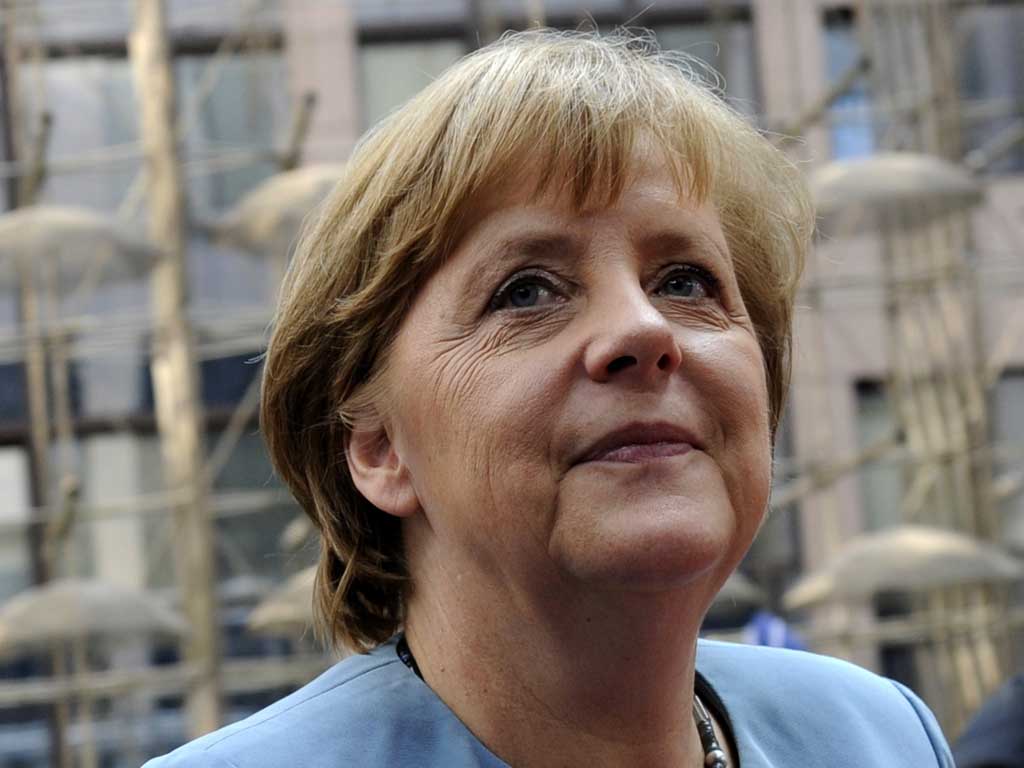Germany can't save everyone, says Merkel as Spain's problems mount
Borrowing costs hit a euro-era record in Madrid as leaders scramble to prevent contagion

Your support helps us to tell the story
From reproductive rights to climate change to Big Tech, The Independent is on the ground when the story is developing. Whether it's investigating the financials of Elon Musk's pro-Trump PAC or producing our latest documentary, 'The A Word', which shines a light on the American women fighting for reproductive rights, we know how important it is to parse out the facts from the messaging.
At such a critical moment in US history, we need reporters on the ground. Your donation allows us to keep sending journalists to speak to both sides of the story.
The Independent is trusted by Americans across the entire political spectrum. And unlike many other quality news outlets, we choose not to lock Americans out of our reporting and analysis with paywalls. We believe quality journalism should be available to everyone, paid for by those who can afford it.
Your support makes all the difference.Spain's 10-year borrowing costs breached 7 per cent yesterday, the highest level since the formation of the single currency, while the flames of the eurozone crisis spread closer to Italy.
Investors continued to dump Madrid's debt as investor confidence that the forthcoming €100bn (£81bn) bailout of the country's toxic banks would be sufficient to solve Spain's fiscal problems drained away. There were further signs of investor concerns over the sustainability of Italian debt too, with Rome forced to pay 5.3 per cent in a debt auction to raise three-year money yesterday, sharply up on the 3.9 per cent last month. Rome also sold €627m of bonds due in 2019 at an uncomfortably high yield of 6.13 per cent. Italian banks helped keep the country's borrowing costs down by buying the bonds, but investors expressed fears that this might not be enough to prevent Italy becoming the next state to require a bailout.
Nick Stamenkovic, of RIA Capital Markets, said: "Investors are demanding an ever-higher premium to buy Italian sovereign paper. With overseas investors shifting out of Italian bonds, domestic investors are stepping up to the plate, but for how long?"
Even German borrowing costs have been rising from record lows in recent weeks, hitting 1.5 per cent for 10-year debt yesterday, as investors have begun to factor in the potential costs for the eurozone's powerhouse economy of bailing out the weaker members of the currency union.
Yet the German Chancellor, Angela Merkel, warned that other European nations should not expect too much from Germany. "We are convinced that Europe is our destiny and our future" she told the Bundestag. "But we also know our strength is not unlimited."
The French President, François Hollande, and Italian Prime Minister, Mario Monti, after meeting in Rome yesterday, said new measures were urgently needed to protect sovereigns from financial market contagion. Mr Monti said: "We agreed that the progressive improvements made to eurozone governance are not enough to shield the euro from market turbulence."
This was echoed by Spain's Finance Minister, Luis de Guindos, who said that steps needed to be taken to bring down Spain's borrowing costs.
The eurozone crisis will be top of the agenda at next week's G20 leaders' summit in Mexico, where pressure will be applied on Ms Merkel to do more to calm the financial markets. A G20 official told Reuters last night that central banks from major economies stand ready to take co-ordinated steps to stabilise financial markets and prevent a credit squeeze should the outcome of Greek elections on Sunday cause chaos in the markets.
Join our commenting forum
Join thought-provoking conversations, follow other Independent readers and see their replies
Comments